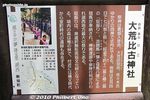 Image search results - "shichikawa" Image search results - "shichikawa" |

Held annually on May 4 in Takashima, Shichikawa Matsuri is Oarahiko Shrine's biggest festival (Reisai). It starts with a procession in the shrine's neighborhood. The shrine is near Shin-Asahi Station (JR Kosei Line).
|
|

Leading the procession are 12 yakko-furi men who carry the horseback archer's wooden targets. Yakko-furi were manual laborers of the samurai. 奴振り
|
|

Shichikawa Matsuri's yakko-furi dance is a Shiga Prefecture Intangible Folk Cultural Property. 滋賀県選択無形民俗文化財
|
|

The Shichikawa Matsuri is held on the same day as the Omizo Matsuri in neighboring Omi-Takashima. So I saw the Omizo Matsuri in the morning, then rushed over to see this festival.
|
|

Yabusame horseback archer.
|
|

Yabusame horseback archer.
|
|

Eight more work horses in the procession. The horses comes from the eight former villages under the shrine's tutelage. 役馬
|
|

The young men performing the yakko-furi come from one of the eight former villages in the area. The former villages take turns in participating in the yakko-furi procession.
|
|

Entrance to Oarahiko Shrine. The shrine was established in the 13th century. It was patronized by the Sasaki clan in the 14th century when they ruled Omi Province. MAP
|
|

First torii of Oarahiko Shrine. It's kind of far from the nearest train station of Shin-Asahi on the JR Kosei Line. Rent a bicycle from the tourist office at the train station. 大荒比古神社
|
|

The path to the shrine also serves as the horse track (baba 馬場) for galloping horses (yabusame).
|
|

About Oarahiko Shrine in Japanese.
|
|

Oarahiko Shrine worships Toyoki-iri-Hiko-no-Mikoto (豊城入彦命), Oaradawake-no-Mikoto (大荒田別命), and the four gods related to the Sasaki clan who ruled Omi (Shiga) in the 14th century.
|
|

Toyoki-iri-Hiko-no-Mikoto was the son of Emperor Sujin, the 10th emperor of Japan. Portable shrine is stored in the Haiden Hall during the festival.
|
|

Oarahiko Shrine was originally established to appease the god to prevent flooding from local rivers. The Sasaki clan worshipped here whenever they went off to war and when they returned triumphantly.
|
|

Nearer to the shrine, the horse track is lined with spectator seating. Apparently, people donated money for a seat to view the procession and galloping horses.
|
|

After lunch, the yakko-furi arrived at the shrine at around 1 pm.
|
|

After a triumphant return home, the Sasaki clan would perform yabusame horseback archery with 12 horses and 12 targets as an offering to the shrine. This was the beginning of this festival.
|
|

They performed their routine twice along different sections of this horse track to enable everyone to see it. It was about 20 min. long.
|
|
|
|
|
|
|
|
|
|
|
|
|
|
|
|
|
|

The yakko-furi proceeded to the steps leading to the shrine and then dispersed.
|
|
|

At 2 pm, they had a ceremony with the shrine priest and representatives from the eight former villages.
|
|

Nice shoes.
|
|
|
|

Then this cute little boy wandered in.
|
|

Turned out that the umbrella holder was his papa whom he had missed.
|
|

Next, the horseback archer approached the shrine.
|
|

Yabusame horseback archer.
|
|
|
|

The horseback archer faced the shrine and gave a ritualistic prayer with a bow at 2:20 pm. He was followed by the eight horseback riders who bowed to the shrine.
|
|

A procession of musicians went up the steps and walked around the shrine.
|
|
|

They pay their respects to the shrine.
|
|

Eight horses waiting.
|
|
|
|

The musicians and umbrella holders go back down from the shrine.
|
|
|

The banner reads, "Oarahiko Jinja."
|
|
|
|

At about 2:40 pm, the yabusame horseback archery began with the yakko-furi boys running down the path.
|
|

They were soon followed by a horse galloping at full speed.
|
|

The boys walk back again.
|
|

And they run again ahead of the horse.
|
|

The horseback archer did not shoot any arrows. (It takes a lot of skill to do it.)
|
|

After his first run, the horseback archer trots back.
|
|

The boys running. When you see them, you know the horse is coming so keep off the path.
|
|

The horseback archer on his second run. He did not shoot any arrows.
|
|
|
|
|

The horseback archer on his third run. He spread his arms while holding a bow and arrow, but did not shoot any arrows.
|
|

Then the remaining horses ran a few times as well, three times each.
|
|
|
|
|
|
|
|
|
|
|

After the yabusame, the yakko-furi boys performed without the targets. This was around 3:40 pm.
|
|

They made their way up to the shrine.
|
|
|
|
|
|

The yakko-furi approach the steps to the shrine.
|
|

Then they ran up the steps.
|
|

And went to carry the mikoshi inside the Haiden Hall.
|
|
|
|

Putting on the phoenix ornament atop the mikoshi.
|
|

A short prayer by the shrine priest.
|
|

A short mikoshi procession led by the shrine priest.
|
|

The mikoshi was hauled on a cart.
|
|

They paraded the mikoshi down the horse track (baba).
|
|
|
|
|
|

At the end of the baba, they turned around, and I left the scene.
|
|
|
|
|
|
|
|
|